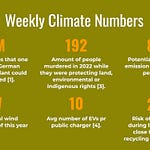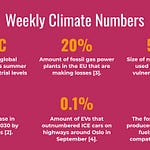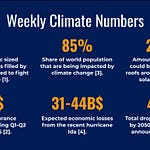Welcome to this weeks edition of The Weekly Climate 🎉
References: [1], [2], [3], [4], [5] and [6].
‼️News you can’t miss
Here’s one important scary/bad (🙀), good (😻), interesting (😼) and fossil (💩) news item.
🙀 Carbon omissions: The amount of carbon dioxide equivalent emissions that a country emits but “forget” to count.
😻 A team of Swedish researchers have had a major breakthrough for making “massless” batteries.
😼 Great cartoon series on the most common tactics employed by the climate delayers.
💩 US banks are soaked in fossil fuels despite pledging divestment.
👩⚕️ Status: Climate & Science
Let’s look at how we’re doing this week!
[#antarctic] — A new study looks into what happens to the Antarctic ice shelves at 1.5C, 2C and 4C of warming. While it’s not surprising that melting increases with higher temperatures, what may be surprising is that warmer temperatures will add more snow (because warmer air holds more water) which will have the opposite effect of the melting.
[#methane] — Despite the pandemic methane emissions are rising faster than ever. In 2018 and 2019 emissions rose by 8.5 and 10.7 ppb respectively. But in 2020 the increase was 14.7ppb. Scientists are not sure yet where the spike comes from. Some hypothesize it could be natural ecosystems, while fugitive emissions from fossil gas plants for sure are also to blame.
[#hurricanes] — Weather forecasters are predicting an above-average hurricane season is in store for us in 2021. They’re expecting 17 named storms, 8 hurricanes and 4 intense hurricanes. For the past 40 years the averages have been 12.1, 6.4 and 2.1 respectively.
[#anthropology] — This article dives into a newly released study that investigates how humans have adapted to the changing climate for the past 2000 years. You may have heard the tales of Mayas or people of the Easter Island and how they were wiped out due to climate change. However, according to this new study that is just not the full story. Yes climate change created challenges and much human suffering, but the challenges were overcome.
📰 The 7 Grand Challenges
⚡️Decarbonize Electricity
Clean electricity is the one do-or-die challenge we must solve.
[#energystorage] — A new report looks at how New York regulators have effectively accelerated the state’s energy storage market by making it easier to deploy storage. The report concludes that this support has helped get approximately 1.2GW of battery storage on to the grid.
[#biden] — Heated looks at Biden’s newly announced 2T$ infrastructure plan and how it still supports the fossil fuel industry. Direct subsidies comes in at 20B$ and indirect subsidies at 82B$.
[#china] — Another look at China’s booming coal industry and what’s driving it. China is responsible for 85% of the worlds newly added coal capacity and is therefore the primary reason why global coal share of the power production last year went up.
🏘 Reduce impact of urban and rural areas
Lowering the impact of urban and rural areas.
[#repairability] — A french law requires manufacturers of electronic devices to give their products a “repairability” score. Recently big tech started to comply with this law and let’s just say nobody is surprised nor impressed by the scores. Apple scores 7 out of 10 for their iPhones and Microsoft has no products that score higher than 5. You can see lists of scores in the article.
[#milk] — A challenge for smallholder dairy farmers in India is that they need to transport the milk to a place where it can be refrigerated fast. Typically, this is done using polluting dieselgenerators but a new collaboration is using batteries powered by renewables to keep refrigerators running.
[#infrastructure] — Politicians like to build freeways. Just here in Denmark the climateminister proudly announced a new freeway despite the fact that we’re one of the most well-connected countries in Europe. In the UK they’re doing the same. The problem though is that the climate impact has been underestimated by a whopping 100x.
🛁 Clean non-electrifiable activities
Some activities we do today can’t be electrified, these must be cleaned some other way.
[#battery] — Swedish researchers have made a breakthrough in making “massless” batteries. They’re of course not completely massless, but the batteries they have demonstrated to work are for sure a lot lighter than the wellknown types, which could make batteries available to more applications than believed so far.
🌳 Protect and grow nature
Nature is our ally, we must protect it and help it help us.
[#seaspiracy] — Seaspiracy. A new Netflix documentary is garnering a lot of positive and good attention. Here’s a review by George Monbiot who’s balanced. And here’s a harsher one from Brian Kahn, whom I also respect. He’s claiming gross factual problems as well as other pretty critical sounding issues with the film. I’m not sure what to think here.
[#peat] — Peat is one of the biggest carbon stores we have, yet it is currently being dug up and used in gardening on a big scale. This is something we should stop doing.
🍽 Optimize food
Without the lower impact of food or drink the hero doesn’t work (modified old danish proverb).
[#locusts] — 2020 saw some of the worst locust swarms in East Africa since the 1950s. A big swarm of locusts may contain as many as 15M insects per square mile. Such a swarm can consume as much food as 13.000 people. This article looks at various technology approaches to fight them.
⚖️ Climate Justice
Without justice there’s no future.
[#ecocide] — Here’s the first in a five part series about the rise of the ecocide movement. A highly interesting read.
[#systemicrisk] — Here’s a detailed article in the New York Times about how rising debt in the global south and climate change poses a systemic risk to the entire world economy. The issue is that many of these countries owe so much to wealthly western economies, while they’re being pummeled by COVID and also being the most climate vulnerable.
[#zimbabwe] — Cleantechnica looks at a female-owned electric scooter delivery in Zimbabwe that was started during the pandemic.
⬇️ Engineered drawdown and geoengineering
Protecting our planet and species one way or another
[#geoengineering] — A few issues ago I posted an article on a geoengineering experiment that had run into headwind. The experiment was mainly a test of key equipment and no actual geoengineering would be performed. Still the experiment was cancelled due to the public uproar created around the experiment.
📦 Other / catch-all
All the other stuff that I couldn’t fit into any of the other categories, than the other category.
[#cartoons] — A brilliant cartoon series displaying the biggest tactics used by the fossil fuel industry and others to delay action on climate change.
[#ev] — A British adventurer will drive an EV from South to North Pole to raise awareness of climate change as well as EVs as a solution. He has done a couple of climate change awareness adventures before such as being the first to participate in and complete in the Mongol Rally in an EV. Sound interesting but also a bit of a hassle and frankly, a polluting affair given all the logistics that are planned for the trip. One might hope that this will erase people’s range anxiety issues for good though..
[#podcast] — I just discovered a great new podcast (new, ahem, it’s 50+ episodes in) that profiles the people behind interesting solutions to our climate crisis. Check it out!
⭐️Special Topics
🎩 Global and local policy
We have a special interest in covering the major global and local policies regarding climate, whether good or bad.
[#omissions] — Here’s a simple video showing what’s true in most parts of the western world that although our country by country emissions have gone down, if you count imported emissions as well we’re not emitting less but more. It’s taken from a UK perspective but probably applies all over.
⛽️Major Carbon Emitters
We have a special interest in covering the moving of the major carbon emitters as these are the key roadblock to climate action.
[#banks] — US banks may be pledging to help the Biden administration to fight the climate crisis yet their boards are soaked in fossil fuels. 77% of board members in the top 7 major US banks have current or past ties with “climate conflicted organizations”.
[#jobs] — One lie that the fossil fuel industry keeps on telling is that it stands for job! If we get renewables no more jobs! Or something like that. But a new study has found that the fossil fuel industry is likely better than any to cut jobs. As new technological developments are expected to cut 20-30% of fossil fuel industry jobs. Even without a transition to renewables.
That’s it for this week folks! Remember if you’re feeling down, angry or sad from some of the news in this newsletter one cure is to act. And one way you can always act that also happens to be one of the most powerful things you can do is to talk about it. That also works if what you just read made you hopeful or happy btw.
If you enjoyed this newsletter don’t forget to share it with your friends, coworkers or other people you think could benefit from getting it. If you got directed here by a friend or another link on the Internet don’t forget to subscribe!
See you all next week 👋















Share this post